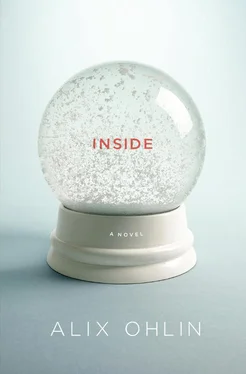“She’s doing great. She really wanted to come today, but I told her you wouldn’t want her to miss her swimming lesson. I’ll bring her tomorrow.”
“I don’t even know how to thank you.”
“Oh, shut up,” Azra said fondly.
“Who’s Sarah?” Mitch said.
Grace’s eyes met his. “My daughter.”
Mitch swallowed, surprised he hadn’t heard that she’d gotten married and started a family. On the other hand, after the divorce they’d migrated into separate social circles and never ran into each other. He’d been the one who stopped seeing their mutual friends, who’d switched neighborhoods and haunts. It was easier that way.
“She’s staying with Azra and Mike while I’m here,” Grace went on. “It sounds like she’s having a great time. I don’t think she’ll want to come home.”
“It’s fun for all of us, having her,” Azra said lightly.
“She’s always hated being an only child,” Grace said. Though her words were wistful, her voice was calm.
There was no mention of the father; Mitch guessed he was out of the picture. He realized that both women were looking at him expectantly. “Is there anything I can do?” he said, more to Azra than to Grace.
“You know, there is,” Azra said. “Maybe it’s weird to ask, but Mike and I are both working, and with the kids and all their activities … Well, is there any way you could go over to Grace’s and do the mail and the plants?”
“Of course. You don’t mind, Grace?”
When she looked at him, her expression was dazed. She couldn’t be bothered to mind right now, that much was clear.
“She lives on Monkland, I’ll write down the address,” Azra said. “Here, I have an extra set of keys. This really helps, Mitch. Thanks.”
He felt dismissed. He squeezed Grace’s hand again — cold against his own — then walked down the green hallway with her keys in his pocket.
He drove west along Sherbrooke, past the dark red turrets of the Westmount Library, the setting sun piercing the windshield. All along the street people were hurrying home from work, leaning forward against the wind that was whipping leaves off trees and whirling them around. He knew a lot of people who lived in this part of town but rarely socialized here, having peeled away this layer of his life a long time ago.
Outside Grace’s building the trees were a riot of green and early, creeping yellow. He walked up the steps, remembering the apartment they had moved into as a young married couple so long ago. They had been so thrilled to buy their first things together, furniture and dishes, all of domestic life a novelty. It was hard to believe they’d ever been so young. He left the mail on a table in the hallway and went into the kitchen, looking for a watering can. There were dirty plates in the sink, and cereal boxes and granola bars and fruit scattered across the counter. But it was a homey kitchen, a child’s smeared finger paintings tacked on the fridge. On the counter was a school photo of a blond girl with a gapped smile and clear, wide-set green eyes. She didn’t look much like Grace, who had had dark hair even as a child.
He couldn’t find anything to water with until, rummaging through the cupboards, he found a teapot that he recognized, queasily, as his mother’s. God knows when she’d given it to them. She’d been dead for seven years.
He filled the teapot with water and wandered from plant to plant. Toward the back of the apartment was Grace’s bedroom, and he peered in for a second and then, seeing no plants, stepped back with a feeling of relief. The other bedroom was a riot of pink sheets and stuffed animals and books and toys. No plants there, either.
Five minutes later he was done, and he put the teapot back exactly where he’d found it, which seemed stupid given how messy the kitchen was, but still. It felt like the right thing to do.
Back at his own apartment, he thought about Grace as he made dinner. When they met, he was halfway through his PhD program, the teaching assistant for a course Grace took called Personality. Later in their relationship, she confessed to having an encyclopedic memory of that time — what they’d said, where they’d been, what each of them had been wearing. He smiled and nodded, but truthfully he remembered little of those early encounters. What stuck in his mind was Grace’s work, her professional, detailed lab reports, so superior to those of her peers that halfway through the term he stopped reading them and gave her an automatic A. The sophistication of her performance was in dire contrast to the handwriting on her quizzes, which was round and bubbly. She didn’t dot her i ’s with hearts or flowers, but she seemed like the kind of girl who had, and not that long ago. She pressed down so hard that sometimes the pen broke through the paper. It was the penmanship of a very young, very determined person.
Although he’d thought then that he was depressed, in retrospect his time as a grad student was, in fact, the happiest of his life. The worries that had so nagged at him now seemed like luxuries. Was psychology important ? Was it effective ? Did it matter ? He stayed up at night chewing over its various intellectual and emotional bankruptcies, and these anxieties functioned as ballast, distracting him from his suspicion that it was himself, not the profession, that was unworthy. Eventually, as he started working, the worries dissipated, and at night he thought about the people he worked with and their problems, not his own.
After that class was finished, he started seeing Grace around the department, meeting with her professors, working in a lab. They would run into each other late at night at the vending machine, or reach for the same milk container at the coffee shop at eight in the morning. Neither of them had a life, so they made one together.
He couldn’t recall a single thing Grace had said to them when they were dating. What he did remember was how he felt, things he’d said that made her laugh or nod at his wisdom. Over candlelit dinners she sometimes looked like she wished she had a notebook handy. At first this was great; then it was uncomfortable. He wanted her to figure out that he wasn’t all that wonderful.
But after he really got to know her, he understood that this was just her nature. She brought the full force of her attention to bear on you, made you drunk with that and with yourself. She wasn’t being manipulative; she was genuinely interested. Once he realized this, though, he began to resent her for not thinking he was uniquely gifted. It was unfair, but he couldn’t help it. He stopped calling, stopped inviting her out. In response, she asked him over, cooked dinner, and started telling him all about herself, her family, stories from her childhood. Then she calmly engineered him into bed, and there, without exactly being the aggressor, she let him know that he had been ignoring her, that it was his turn to pay attention. And he did.
A year later they were married. They were in their early twenties, and the only married people they knew were their parents’ age. Everyone seemed to think it was cute — or reckless. “You’ll be divorced before you’re thirty-five,” his mother muttered darkly when he gave her the news. And she was right, as she was about most things. She had loved Grace, though. He wondered if she still thought they’d get divorced when she handed over the teapot. She was a materialist, his mother, stroking her favorite blanket and cardigan sweater in her last days at the hospital, long after she’d forgotten his name.
He had never wanted to admit it, but he mourned the loss of Grace the student, the adoring undergrad. When she got her own degree and they became peers, the tectonic plates beneath them shifted, resettled. They stopped having sex. They were buddies. What this said about him, his loss of desire, his need to dominate, was so profoundly unflattering — and so unutterably, unchangeably true — that he couldn’t even think about it.
Читать дальше












